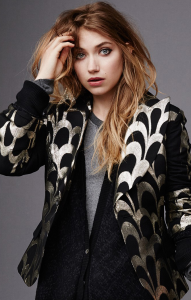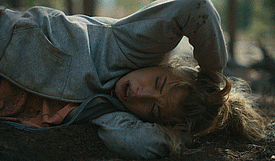I’m always attracted to people who are a little bit off

Given her affinity for 1970s cinema—or anything prior—British actor Imogen Poots is a natural lead for her new film She’s Funny That Way, a Peter Bogdanovich revival of the ’30s and ’40s screwball comedy. Set around the production of a Broadway show, the film stars Owen Wilson as a director who becomes enamored with Poots, a hooker, and casts her in his play opposite both his wife and ex-lover. A complicated farce of crossed love interests that also throws in the playwright (Will Forte) and his therapist (Jennifer Aniston), She’s Funny That Way is a contemporary homage to its genre, playing a strong feminine cast against bumbling masculinity.
It’s not hard to imagine a modern-day Poots holding her own among a crowd of Hollywood’s Golden Age, with all the energy and charm to tame both the director’s bullhorn and her on-screen love interests with a glance and offbeat quip. Many of Poots’ roles, though, are far from old fashioned. Her credits include 28 Weeks Later, the videogame-inspired Need For Speed and an upcoming Cameron Crowe pilot, Roadies. She’s now in league with some fine talent in She’s Funny That Way, produced by filmmakers Wes Anderson and Noah Baumbach—both protégés of ’70s heavyweight Bogdanovich—with a cameo by Quentin Tarantino.
HGS: Did you enjoy the shoot?
IP: It was so much fun. It’s a rare thing, in a way, to really like the clothes that you’re wearing. The stylist was awesome and had some really cool ideas. It was very couture, but grunge—kind of like an expensive homeless person. It was really, really fun. We played music and boogied around.
HGS: As we’re both British, I’m curious to ask you what it’s like as a British actor in America. Do people make assumptions about the kind of person you are based on your nationality?
IP: Not really, and it’s such a versatile business anyway. I forget I’m talking to someone who is British or Australian or American because I get used to hearing so many different accents. There’s such a heavy presence of British actors and actresses right now, too. In the same way certain parts of America are fascinated with England and English culture, I am fascinated by the simplest thing. For example, the first time I was in Albuquerque, New Mexico, I thought it was the greatest place ever and everyone else thought I was insane. But it was just the antithesis of anything that I’ve seen in London and you always seek that unknown place.
I guess I romanticize America in the way that you hope it’s going to be everything you’ve heard, and the reality is actually pretty spot-on. Even Los Angeles, there’s a side that’s so business orientated and clinical or sterile, but if you drive out far enough you find that Joan Didion and Joni Mitchell landscape. It’s there if you’re paying attention.
HGS: Why did you choose New York for your base? Have you ever lived in Los Angeles?
IP: When I moved to Los Angeles, it seemed like an obvious thing to do at that point. It was more affordable than New York. I’d just met a bunch of people who I thought were really terrific, and I moved in with a friend. I was very curious about it because you hear great things and bad things about the place, and it makes it very intriguing. You make your own experience in LA. It takes a while to crack the city. People are always shitting on Los Angeles, but it’s a great place. You just have to be kind of resilient or something. You have to dig or dive for the gold. But you need to live your life in a way that will inform your work, and I couldn’t wait to live in New York. I think I’ll just end here in New York.
HGS: A lot of people seem to describe you as eccentric, kooky or quirky. Peter Bogdanovich recently said something similar to that about working with you on your movie She’s Funny That Way. Does it make you self-conscious?
IP: Whatever you are doing, it’s far more palatable and digestible for people to put you in a box. It’s not a bad box to be in. I think it sounds interesting. Although, there are few people who have transcended that immediate labeling. You’re supposed to know yourself better than anyone else, but I’m sure if you met yourself you’d be like, “Oh my god, what are you doing? Just give up!”
HGS: You have a bunch of amazing films coming up. Do you feel like you’re on some kind of stardom precipice? Is it exciting to become more well-known or is it nerve-wracking?
IP: People think the goal is to just do really big movies or something. But as an actor you understand the work you want to do, and if you’re allowed to do that, then that’s great. I feel very creatively satiated. I’m excited by projects I’ve done in the last year more than ever before. If I can keep working with filmmakers like that, I’d be happy as a clam. But it’s the same with any job; if you’re just doing it for a long time—although acting is unusual in its unpredictability—then you just keep doing it, and you don’t really consider the future in a way. As you grow up you realize this is the future right now. I feel very excited. I never feel thoroughly content, but I feel happy to have been a part of some of these projects.
HGS: What other female actors of your generation do you admire?
IP: I adore Mia Wasikowska, Rooney Mara and Felicity Jones. There are people who are great in everything they do and make great choices. It’s exciting to be around those types of women. There’s such a sprawling bunch actually… Bree Larson. Alia Shawkat—we did a film together and she is a really amazing girl. Alia is like a Renaissance man; she’s got everything going on. These women are just terrific.
HGS: Which character in your most recent projects do you feel most similar to?
IP: I know which are my favorites, but those tend to be the ones where you don’t have to be yourself. Normally, what intrigues you about a role is the exit strategy from your own identity. Of course you bring a basket of your own idiosyncrasies, which is inevitable because you’re you. You grow fond of any character you play. You have to be able to defend them down to the ground, even if in other people’s eyes they’re villains.
Kelly Ann is the role I played in the pilot for this new Cameron Crowe show, Roadies. I don’t know how similar we are, but there’s a gauche quality to her, and if you put her up against a Marilyn Monroe-type she looks kind of like a shrimp. She’s sort of awkward and just trying her best to be a girl, and it’s not working out. I’m always attracted to people who are a little bit off. I feel like we’ve all met this girl, and she will just never get it right. We have all felt that unease, and it makes us remember we are all just bags of nerves jiggling around the earth.
HGS: It’s cool that these days you can swap between TV and film and back and that it works for an actor’s career.
IP: You can get caught in this mindset that I was certainly a victim of, this idea of ’70s cinema. That’s my favorite decade of films. You get stuck on the idea that that’s what movies are and what movies should be and that’s what you should do as an actor. Then the more you live and the more you experience, your taste changes and the culture changes, and now the TV and film landscapes have blended together. It took me a second to understand that. I ideally want to do work that I feel proud of and exhilarated to do, and whether that’s a play or TV, you’ve just got to do it. It’s your life. You choose it by the role and the director and cast.
HGS: She’s Funny That Way is an old-fashioned style screwball comedy like something from the ’30s or ’40s. It has a very different feel to contemporary comedies.
IP: I rarely watch movies these days, so all my favorite films are older films. When you see Jack Lemmon or Peter Sellers in a movie, you’re living in an alternate universe with these characters. I do get how it might be hard to understand—for someone living now—the extraordinary brilliance of Preston Sturges movies. To meet Peter Bogdanovich made me so nervous and so excited because I’d seen all his movies. He loves films from the ’30s and ’40s. To work with him was an amazing experience. He doesn’t get a ton of coverage; he just knows in his mind what he wants. He thinks in seconds and minutes, so the rhythm is essential. He’s interesting because he’s got his own style. This film has an older quality, and it is a screwball comedy. It will be interesting to see what people think because the humor is from a different time. My granddad would love this film! That might not be the message I should be sending out, but I find it very funny myself. Some of the women in those ’30s and ’40s movies had glorious parts. Often the men are absolute lemons and complete beasts and the women are just these incredible strong women—in a way, we’ve got to look back to these older narratives.





















Recent Comments